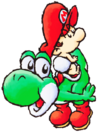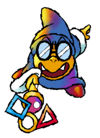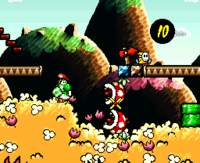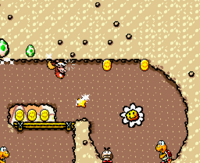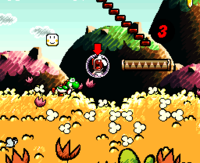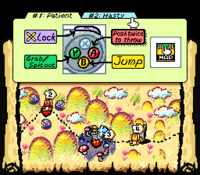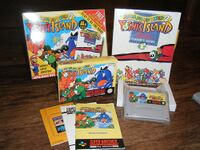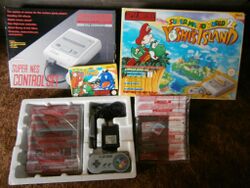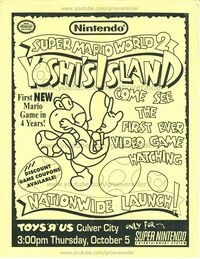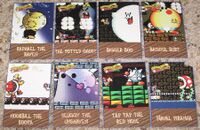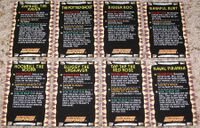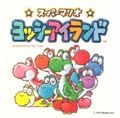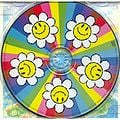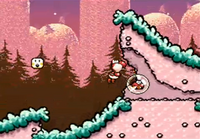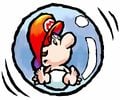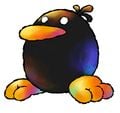Super Mario World 2: Yoshi's Island
Template:Articleabout Template:Infobox
Super Mario World 2: Yoshi's Island (titled Super Mario: Yossy Island スーパーマリオ ヨッシーアイランド Sūpā Mario: Yosshī Airando in Japan, and sometimes referred to as Yoshi's Island) is a video game developed by the Nintendo Entertainment Analysis and Development division for the Super Nintendo Entertainment System in 1995. Although its English title suggests that it was intended to be a sequel to the 1990 video game Super Mario World, it is a prequel and its Japanese title may indicate that it belongs to a separate lineage. It stars Yoshi and his Yoshi clan who, while carrying Baby Mario, travel across Yoshi's Island to reclaim the kidnapped Baby Luigi from Baby Bowser and his Magikoopa minion, Kamek.
Super Mario World 2: Yoshi's Island is the first platform game in the Yoshi series, and the fourth entry overall. It was followed by a loose sequel, Yoshi's Story, in 1998 for the Nintendo 64. In 2002, Super Mario World 2: Yoshi's Island was remade as part of the Super Mario Advance series for the Game Boy Advance as Yoshi's Island: Super Mario Advance 3. In 2006, a sequel, Yoshi's Island DS, was released for the Nintendo DS. Tetris Attack, Yoshi Touch & Go, and Super Smash Bros. Brawl borrowed the characters and settings from Super Mario World 2: Yoshi's Island.
Super Mario World 2: Yoshi's Island was one of three completed games to use the Super FX 2 chip, which handled sprite scaling and rotation (advertised as "Morphmation" technology), basic polygonal rendering, and advanced parallax scrolling.
The music was composed by Koji Kondo and was released in Japan on November 25, 1995, in compact disc format as Super Mario: Yoshi Island Original Sound Version.
Plot
From the first cinematic of Super Mario World 2: Yoshi's Island:
A long, long time ago . . . This is a story about Baby Mario and Yoshi.
A stork hurries across the dusky, pre-dawn sky. In his bill, he supports a pair of twins. Suddenly, a shadow appears in a gap between the clouds and races towards the stork with blinding speed.
"SCRREEEECH!!!"
"THE BABIES ARE MINE!"
WOW!!! Snatching only one baby, the creature vanishes into the darkness from whence it came.
The second baby falls undetected towards the open sea. . . OH NO. . .
Meanwhile, here is Yoshi's Island, home to all Yoshies. It's a lovely day, and Yoshi is taking a walk. HUH?!? Suddenly, a baby drops in onto his back. The baby seems to be fine. This is very fortunate! Wha-? Something else fell with the baby . . . Let's take a peek . . .
It looks like a map. Maybe the stork was using it? But Yoshi can't figure it out. Yoshi decides to talk to his friends.
AAAKK!!! Kamek, the evil Magikoopa, and kidnapper of the baby, quickly dispatches his toadies, when he discovers that he missed the other baby!
Yoshi heads leisurely back to the other Yoshies, unaware of the danger at hand. Kamek's forces are actively searching the island.
Will these two children ever reach their parents safely?
From the second cinematic of Super Mario World 2: Yoshi's Island:
This paradise is Yoshi's Island, where all the Yoshies live. They are all in an uproar over the baby that fell from the sky.
Wait! The baby seems to know where he wants to go . . . The bond between the twins informs each of them where the other one is. The Yoshis decide to carry the baby to his destination via a relay system. Now begins a new adventures for the Yoshies and baby Mario.
Gameplay
Like previous entries in the Mario series, Super Mario World 2: Yoshi's Island is a two-dimensional, side-scrolling platform game. Unlike its predecessors however, the game involves a radically different moveset and approach to mortality.
In addition to the typical run and jump controls, the Yoshis can also ingest enemies and manipulate objects using their tongue. After ingesting an enemy, the Yoshi can either eject or swallow them. Swallowing them allows the Yoshi to lay a Yoshi Egg, which he can carry up to six of. The Yoshi can then aim and throw the eggs. These projectiles damage enemies, ricochet off solid surfaces, and skim across water. If the Yoshi comes into contact with a Super Star, Baby Mario will transform into Superstar Mario, granting him temporary invincibility.
Super Mario World 2: Yoshi's Island introduces the concept of time-based health. When the Yoshi comes into contact with an enemy, Baby Mario will become encased in a bubble and float in the air. While Baby Mario is in this state, a Countdown Timer will appear, counting down in seconds until it reaches zero. When starting a level, the timer is begins at ten. If it falls below ten, it will slowly regenerate until reaching ten after Yoshi recovers Baby Mario. If the timer reaches zero, Toadies will kidnap Baby Mario, resulting in the deduction of one life. The timer can be increased to a maximum of thirty by collecting starmen, using 10-Point Stars and 20-Point Stars, and entering Middle Rings. Entering a Middle Ring will also mark the point where the Yoshi can continue from if it loses a life.
The objective of each level is to reach the GOAL! Ring. Players are given the option of collecting five flowers, twenty red coins, and thirty starmen. The GOAL! Ring is also a roulette. There are ten spots on the roulette. Five of the spots can be made winning spots by collecting the five flowers dispersed in each level. At the end of each level, the player's score is tallied, with flowers worth ten points each, red coins one points each, and starmen one point each. Attaining a perfect hundred points in all eight level in a world will unlock a Bonus Challenge and an extra level on the level selection map.
In some parts of some levels, there are sidescrolling parts similar to Donkey Kong Country, however with toned-down graphics.
Controls
There are two controller configurations. By default, Patient is selected.
Patient
- D-Pad Up: Press to look up, hold to move the camera upwards
- D-Pad Down: Press to duck, hold to move the camera downwards
- D-Pad Left: Moves left
- D-Pad Right: Moves right
/
:Brings up the score and item selection menu.
/
:Brings up the level options menu.
/
 :Press to bring up the targeting reticule, press again to throw a Yoshi Egg
:Press to bring up the targeting reticule, press again to throw a Yoshi Egg/
 :Press to jump, hold to Flutter Jump
:Press to jump, hold to Flutter Jump/
 :File:Gba YI target.png Press to lock the targeting reticule in place
:File:Gba YI target.png Press to lock the targeting reticule in place/
 :Press to ingest enemies, press again to spit out enemies
:Press to ingest enemies, press again to spit out enemies
Hasty
- D-Pad Up: Press to look up, hold to move the camera upwards
- D-Pad Down: Press to duck, hold to move the camera downwards
- D-Pad Left: Moves left
- D-Pad Right: Moves right
/
:Brings up the score and item selection menu.
/
:Brings up the level options menu.
/
 :Hold to bring up the targeting reticule, release to throw a Yoshi Egg
:Hold to bring up the targeting reticule, release to throw a Yoshi Egg/
 :Press to jump, hold to Flutter Jump
:Press to jump, hold to Flutter Jump/
 :File:Gba YI target.png Press to lock the targeting reticule in place
:File:Gba YI target.png Press to lock the targeting reticule in place/
 :Press to ingest enemies, press again to spit out enemies
:Press to ingest enemies, press again to spit out enemies
Worlds and Levels
Note: "Secret" levels are only in the Advance port and are not featured in the original.
World 0
World 0 consists solely of a short and basic tutorial level, only playable after starting a new file.
World 1
World 1 takes place in a grassy plain, and gives a taste of the different types of stages in the game.
- Make Eggs, Throw Eggs
- Watch Out Below!
- The Cave of Chomp Rock
- Burt the Bashful's Fort
- Hop! Hop! Donut Lifts
- Shy Guys on Stilts
- Touch Fuzzy, Get Dizzy
- Salvo the Slime's Castle
- Secret: Exercise in the Skies
- Extra: Poochy Ain't Stupid
World 2
World 2 is a forested mountainous region in the uplands. It boasts more complex levels and more enemies.
- Visit Koopa and Para-Koopa
- The Baseball Boys
- What's Gusty Taste Like?
- The Bigger Boo's Fort
- Watch Out for Lakitu
- The Cave of the Mystery Maze
- Lakitu's Wall
- The Potted Ghost's Castle
- Secret: Mystery of the Castle?
- Extra: Hit That Switch!!
World 3
World 3 is located in a steamy jungle, and contains a lot of water sections.
- Welcome to Monkey World!
- Jungle Rhythm...
- Nep-Enut's Domain
- Prince Froggy's Fort
- Jammin' Through the Trees
- The Cave of Harry Hedgehog
- Monkeys' Favorite Lake
- Naval Piranha's Castle
- Secret: Go! Go! Morphing!
- Extra: More Monkey Madness
World 4
World 4 takes place in a sunset landscape.
- GO! GO! MARIO!!
- The Cave of the Lakitus
- Don't Look Back!
- Marching Milde's Fort
- Chomp Rock Zone
- Lake Shore Paradise
- Ride Like the Wind
- Hookbill the Koopa's Castle
- Secret: Fight Toadies w/ Toadies or Fight Baddies w/ Baddies
- Extra: The Impossible? Maze
World 5
World 5 takes place on an icy mountain. The first three stages take place on the mountain, while the last four are in the sky.
- BLIZZARD!!!
- Ride the Ski Lifts
- Danger - Icy Conditions Ahead
- Sluggy the Unshaven's Fort
- Goonie Rides!
- Welcome to Cloud World
- Shifting Platforms Ahead
- Raphael the Raven's Castle
- Secret: Items are Fun!
- Extra: Kamek's Revenge
World 6
The last world is located on the Bowser's Kingdom. It has lots of barren landscape and caverns, as well as lava, spikes, and many obstacles.
- Scary Skeleton Goonies!
- The Cave of the Bandits
- Beware the Spinning Logs
- Tap-Tap the Red Nose's Fort
- The Very Loooooong Cave
- The Deep, Underground Maze
- KEEP MOVING!!!!
- King Bowser's Castle
- Secret: Endless World of Yoshis or Crazy Maze Days
- Extra: Castles - Masterpiece Set (called Ultimate Castle Challenge in GBA port)
Enemies
Enemies marked with * are exclusive to Super Mario World 2: Yoshi's Island and the Game Boy Advance remake. Italic enemies are invincible, and Bold enemies are almost invincible (can be defeated under certain conditions).
Bosses
Each world features a midway fort and an end-world castle, both with their own boss. Every boss is just an enlarged version of a basic enemy that Kamek super-sizes with his magic. The only exception is Prince Froggy, who remains at his normal size while Yoshi and Mario are shrunk; he then eats them and the battle is located in his stomach.
- World 1
- World 2
- Bigger Boo (Fort)
- Roger the Potted Ghost (Castle)
- World 3
- Prince Froggy (Fort)
- Naval Piranha (Castle)
- World 4
- Marching Milde (Fort)
- Hookbill the Koopa (Castle)
- World 5
- Sluggy the Unshaven (Fort)
- Raphael the Raven (Castle)
- World 6
- Tap-Tap the Red Nose (Fort)
- Tap-Tap the Golden (Castle, Door 3)
- Baby Bowser (Castle)
- He is then transformed into a giant Baby Bowser by Kamek for the true final boss battle.
Remakes and Ports
- Main article: Yoshi's Island: Super Mario Advance 3
Yoshi's Island: Super Mario Advance 3
Yoshi's Island: Super Mario Advance 3 is a remake of Yoshi's Island for the Game Boy Advance as part of the Super Mario Advance series. It was released in 2002 and has a number of differences from the original surrounding gameplay, content and graphics, as listed below.
New Features
Some new features for this game are the bonus levels and the sound effects. If the player gets all 100 points on each level they will go to a secret level. Also when Yoshi jumps, flutter jumps, crouches or throws an egg, Yoshi will make sounds when he does those things. Since there are Bonus levels and the game is on the Game Boy Advance the map looks slightly different.
List of Changes
- The Pause Menu has changed. Instead of one menu handling all functions, there are now two. One allows the player to put their Game Boy Advance into sleep mode, or return to the overworld map. The other, which is a redesigned version of the original's pause screen, allows the use of items, and displays the player's current score for the level.
- The Yoshi's Island Mini Battle code was changed (because the Game Boy Advance didn't have
and
buttons) to
 ,
,  ,
,  ,
,  ,
,  (while holding the
(while holding the button).
- Level Changes
- A new room has been added to the level 1-8 (Salvo the Slime's Castle). It is between what were the second and third rooms in the original game. It has one Shy Guy-spawning pipe.
- The original version had 21 red coins in More Monkey Madness (Extra 3), but the remake has the usual 20. There was a red coin under a Tap-Tap on a ground pound stake. This has been removed from the remake.
- An extra Middle Ring has been added to 4-4 (Marching Milde's Fort).
- The final room before the boss in 4-8 (Hookbill the Koopa's Castle) has been redesigned.
- All of the extra levels in the original game were modified for this version, most noticeably Kamek's Revenge.
- The biggest change was the addition of six entirely new levels in the remake, called Secret levels. These are to the left of the Extra Levels on the map screen, and are unlocked by defeating Baby Bowser on level 6-8. Consequently, it is no longer necessary to have a perfect score in a particular World, to unlock that World's extra level.
- The final level of the game had its name changed from "Castles - Masterpiece Set" to "Ultimate Castle Challenge".
- Graphical Changes
- Much of the wording has changed throughout the game's dialog. Notable examples include: in the opening cinematic, the story in the SNES version starts "A long, long time ago... This is a story about baby Mario and Yoshi..." The GBA version starts out "This is a story about Baby Mario and Yoshi... A story that took place a long, long time ago." At the world 3-8 boss, when Kamek appears, he says in the SNES version, "Give it up, Yoshi, you cutie without a navel! Ooopp- forget it..." whereas in the GBA version, he says "Give up, Yoshi, you egg-throwing maniac! Ooops... Forget that!" Finally, when entering Bowser's room, Kamek says "YOU! are n-n-not welcome HERE!!! Yoshi, please hand OVER THE BABY!"(SNES), or "Welcome!!! Yoshi, if you would be so kind, please HAND OVER THE BABY!"(GBA)
- As always, the palette is lightened to combat the original Game Boy Advance's lack of a backlight.
- In the original, the Yoshi who completed the x-2 levels was a very dark shade of pink. However, they appeared red on the map. Similarly, the Yoshi who completed the x-7 levels was red, but appeared hot pink on the map. In the remake, the x-2 Yoshi is always light pink, and the x-7 Yoshi is always red.
- All Yoshis had red shoes in the original. In the remake, they have different colored shoes, as in Yoshi's Story.
- When Yoshi touches a Fuzzy in the original game, the background smears erratically and fades between random colors. The ground also ripples. In the remake, the background doesn't smear or tint. However, it does fade between white and its normal colors. The ground ripple is also less fluid in the remake. This probably happens because the Game Boy Advance is not able to handle the Super FX chip-powered graphic effects as well as the original.
- Probably related to the above, Red Coins were given away in the original; while yellow coins followed the rippling of the ground, Red Coins did not. In the remake, all coins ripple with the ground.
- In underground levels with "sparkling" ground, mushrooms and other foreground decorations sometimes have their palettes changed. This is done to fix a glitch where some black objects would also sparkle.
- Sealed doors have different graphics. The boards that cover them aren't visibly bisected, as in the original.
- Kamek's magic has a different visual effect. The colored cloud is absent, while the cycling sparkles remain.
- The overworld map was redesigned. The path the Yoshis follow to their goal is now in a straight line (due the GBA screen limitation), and spots have been added to the map for each world's two hidden levels. Additionally, a "world select" screen was added, and if the player has not yet completed world 6-8, baby Luigi is shown on world 6's spot on the world select map. He is seen in a bubble, crying, much like Mario when he is knocked off Yoshi's back.
- The GBA version's credits are shorter than the original, with some different staff members. As a remake, the credits list "Original YI Staff" under "Special Thanks." The producer of the SNES version was Shigeru Miyamoto, and Hiroshi Yamauchi served as executive producer. The GBA version's producer and executive producer were Takashi Tezuka and Satoru Iwata, respectively.
- Sound Changes
- The game's soundtrack was downgraded to match the Game Boy Advance's sound capabilities.
- The full length opening of the world x-8 boss music plays for all big bosses, rather than for just the Naval Piranha and Raphael the Raven.
- In world 6-8, when being chased by Tap-Tap the Red Nose, the "path to the boss" music is played, rather than the world x-8 boss music.
- Several sounds in the original were replaced by sound clips similar to the ones heard in Yoshi's Story - most notably the Shy Guys' and Yoshis' voices.
Version differences
The NTSC box containing the game shows Yoshi carrying Baby Mario next to a Blargg.
The European version of the game was distributed in two types of boxes. The first type of box is identical to the NTSC version of the box, except with yellow borders instead of black. The second box is much larger and includes the both the official Nintendo Power guide and the aforementioned box.
The Japanese box art shows a group of Yoshis and Baby Mario floating in a bubble.
Super Mario World 2: Yoshi's Island was also included with an SNS-101 model of the Super Nintendo Entertainment System in NTSC regions.
The game also came bundled with the Super Nintendo Entertainment System in PAL regions as part of the "Super NES Control Set". Curiously, the large box art used the foreground from the NTSC box art and the background from the Japanese box art.
Promotional event
An event was held in front of a Toys "R" Us in Culver City, California on October 5, 1995 at 3:00 PM to promote the North American release of Super Mario World 2: Yoshi's Island.
At the event, there were a trailer and a large model Yoshi Egg surrounded by hay. The trailer held a banner with the words "Play It Loud" and stock art of Super Mario World 2: Yoshi's Island. The Yoshi Egg held a banner with the word "Nintendo".
The organizers of the event pledged to donate five hundred dollars to local schools on the condition that the principals of these schools sit on top of the Yoshi Egg for fifteen minutes. A person in a one-piece Mario and Yoshi costume also was seated on top of the Yoshi Egg. Participants could go on and off the egg by means of a forklift.
The event centered around "hatching" the Yoshi Egg. After the hosts interacted with the idle audience, children were lined up and given small, green hammers which they used to break open a designated area at the bottom of the egg. The Yoshi Egg, when breached, yielded stringed paper and a large model of the Super Mario World 2: Yoshi's Island cartridge. Group photos were then taken of the children with the cartridge.
A raffle was then held with one winner receiving a Super Nintendo Entertainment System which includes a copy of Super Mario World 2: Yoshi's Island. Other winners may have won t-shirts.
Discount coupons were also distributed.
At least two flyers promoting the event are known to exist.
Promotional Material
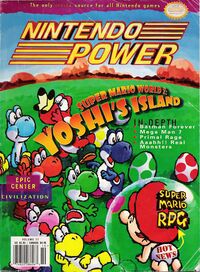
Super Mario World 2: Yoshi's Island was the cover feature of Volume 77 of Nintendo Power.
Nintendo Power also distributed eight promotional cards, each featuring a different boss as part of their collectible Super Power Club series of cards which began in October 1992 with Volume 44 of Nintendo Power. The front of each card has an in-game image of the character and the reverse had a brief description of the character. These cards included:
- Raphael the Raven
- Roger the Potted Ghost (titled "The Potted Ghost")
- Bigger Boo
- Burt the Bashful (erroneously titled "Bashful Burt")
- Hookbill the Koopa
- Sluggy the Unshaven
- Tap-Tap the Red Nose (erroneously titled "Tap Tap the Red Nose")
- Naval Piranha
Super Mario World 2: Yoshi's Island was also the subject of volumes 14 and 15 of Super Mario-Kun. It was also made into a three-volume manga series titled Super Mario: Yoshi Island by Kazuki Motoyama, who had previously written a manga based on the game Yoshi, and published by Kodansha Limited. The game was also adapted into the 4-Koma Gag Battle series of mangas.
The website for Yoshi's Island: Super Mario Advance 3 was created by White Runkle Advertising.
There are also a large amount of figurines, plushies, keychains, stickers, guides, comics, and jigsaw puzzles featuring the characters from Super Mario World 2: Yoshi's Island.
Promotional Videos
Nintendo of America distributed Super Mario World 2: Yoshi's Island: A Magical Tour of Yoshi's Island, a six minute-long promotional VHS. The video featured Ken Lobb and the same person who narrated the Donkey Kong Country: Exposed promotional VHS. Super Mario World 2: Yoshi's Island was also featured in the The Invasion of Nintendo VHS. The video also featured Ken Lobb.
Another promotional video, titled 'The Invasion of Nintendo', was included with a copy of Nintendo Power. The video featured Super Mario World 2: Yoshi's Island along with some other video games. Ken Lobb made another appearance.
There exists another untitled promotional video that was likely shown on monitors in video game stores. It is about fifty seconds long and consists of clips of the game along with some narration. Most notably, however, the clips are from a beta version of Super Mario World 2: Yoshi's Island that has some differences from the released game [1].
There are two televised commercials for Super Mario World 2: Yoshi's Island: one in English, and one in Japanese.
There are two televised commercials for its remake, also one in English and the other in Japanese.
Super Mario-Kun, volume 14.
Super Mario-Kun, volume 15. The Yoshi Helicopter is on the cover along with Superstar Mario (Baby Mario).
- Guide2.jpg
The official guide from Nintendo Power.
Blue Yoshi plushie released in Japan. This is part of a larger set of plushies, each featuring a different colored Yoshi.
Unpainted figurine of a Bandit carrying Baby Mario. This is part of the aforementioned set of figurines.
- BabyMarioCrib.JPG
Baby Mario figurine with crib.
A set of stamps which also includes characters from Donkey Kong Country.
- A Magical Tour of Yoshi's Island Box.png
Super Mario World 2: Yoshi's Island: A Magical Tour of Yoshi's Island box.
- スーパーマリオ~ヨッシーアイランド オリジナル・サウンド・ヴァージョン.jpg
Media
Beta elements
- This game code includes sprites for what appears to be several forms that didn't make the final cut: including, a mushroom, a tree, and a plane (which was likely replaced by the Yoshi Helicopter).
- There is also a Biting Bullet Bill that is fully functional but is unused, however it does appear in the remake Yoshi's Island: Super Mario Advance 3.
Glitches
- Main article: List of glitches in Super Mario World 2: Yoshi's Island
Template:Conjecturaltext
NOTE: Yoshi must have the 10 Stars or 20 Stars item to activate this glitch.
In World 5-5: Goonie Rides!, the player should go to the area with the Helicopter Morph Bubble. The player should hit a Goonie and wait until the counter reaches zero. While the Toadies are taking Baby Mario away, the player should quickly hit him with Yoshi's tongue and touch the Helicopter Morph Bubble. Once Purple Yoshi has already transformed, the Toadies will try to take Baby Mario again. When they pop Baby Mario's bubble, the player must open their inventory and select the 10 Stars or 20 stars item. When the Toadies are gone, the player must wait until Yoshi transforms back to normal. The player is able to eat Mario if Yoshi licks him. Even though Baby Mario still missing, the game won't freeze, but the level is rendered impossible to complete.[2]
Template:Conjecturaltext
This glitch must be done in Bowser's Castle, in the Door 1. The Player must go to an area where a ! Switch near a long lava pit can be found. The player would normally have to hit the switch in order to get across the lava, activating the Dotted Line Blocks. If the player jumps in the lava, in the direction of the switch, Yoshi will perform a last jump, since he burned himself. If done right, Yoshi will hit the switch, and come back to life. The music stops, and the player controls Yoshi normally, even though he was supposed to lose a life. If the player attempts this glitch while Yoshi only has 1 life left, he will have 0 lives, as shown in the pause screen. However, if the player repeats this process, Yoshi will instantly get 999 lives. [3]
Gallery
- YoshiCopter.png
References to Other Games
- Super Mario Bros.: This game's "end of level" fanfare is remixed at the end of the credits. Also, Kamek states in Yoshi's Island that the Mario brothers will eventually foil the Koopa Tribe's plans, referring to how they'd indeed do it in Super Mario Bros. and actually the whole series.
- Super Mario Bros. 2: Part of this game's "character select" theme is part of Yoshi's Island's "Athletic" theme. Shy Guys and Snifits originated in this game.
- Super Mario Bros. 3: World 6 looks a lot like Dark Land, and even has giant mushrooms near Bowser's Castle. Yoshi's sprite is based on the All-Stars version of the game.
- Super Mario World: Baby Mario rides Yoshi, similarly to how Mario could ride him in Super Mario World. Additionally, the American and European versions of the game are sold as Super Mario World's second installment (although the game actually happens first in the Mario series' timeline).
References in Later Games
- Super Mario RPG: Legend of the Seven Stars: The character of the Magikoopa has a Psychopath thought that strongly implies it is Kamek; while he is clearly familiar with Bowser in the English translation, the Japanese version of the line indicates that he recognizes Mario as the baby.
- Paper Mario: Raphael the Raven returns, and Lava Piranha is similar to Naval Piranha. Additionally, One of Parakarry's attacks is similar to the Targeting system.
- Mario & Luigi: Partners in Time: Yoshi's Island's events are mentioned by Kamek.
- Yoshi Story: This game was originally titled Yoshi's Island 64.
- Mario Golf (Nintendo 64): Yoshi Island (the SMW2 version of Yoshi's Island in the Japanese continuity) re-appears, and the Yoshi who's playable may be Yoshi's Island's green Yoshi due to his size and the fact he's carrying Baby Mario.
- Mario Party Advance: Naval Piranha returns, alongside Goonies and other species.
- Yoshi Touch & Go: This game is a retelling of Yoshi's Island's events.
- Yoshi's Island DS: Yoshi's Island's events are mentioned at the start of the game, and the whole game is a direct sequel of Yoshi's Island story-wise.
- Itadaki Street DS: This game features the map of Yoshi's Island.
Trivia
- In the Super Mario-Kun adaptation of this game, Mario and Luigi go to the past with Bowser by mistake. They stop Kamek from kidnapping Baby Mario and help Yoshi reunite the Baby Bros. But, in the Donkey Kong Country adaptation of Super Mario-Kun, it is revealed Yoshi does not remember anything about any adults here and nothing about the Baby Mario tantrums.
- The game was placed 18th in the 100th issue of Nintendo Power's "100 best Nintendo games of all time" in 1997.[4]
- While the English version is called "Super Mario World 2", the original Japanese title is "Super Mario: Yoshi's Island". This was to draw a connection to Nintendo's earlier SNES success, Super Mario World. However, this also generated a lot of confusion as to whether to call it a sequel or not, even if it is clearly a prequel to the entire series. Similarly, Super Mario World was also known as Super Mario Bros. 4 in Japan.
- The game places 185th in the 200th Issue of Game Informer's "Top 200 Games of All Times", the lowest ranked Mario series game.
- This is the first Mario game with French and German localizations.
References
Template:BoxTop Template:Yoshi series
